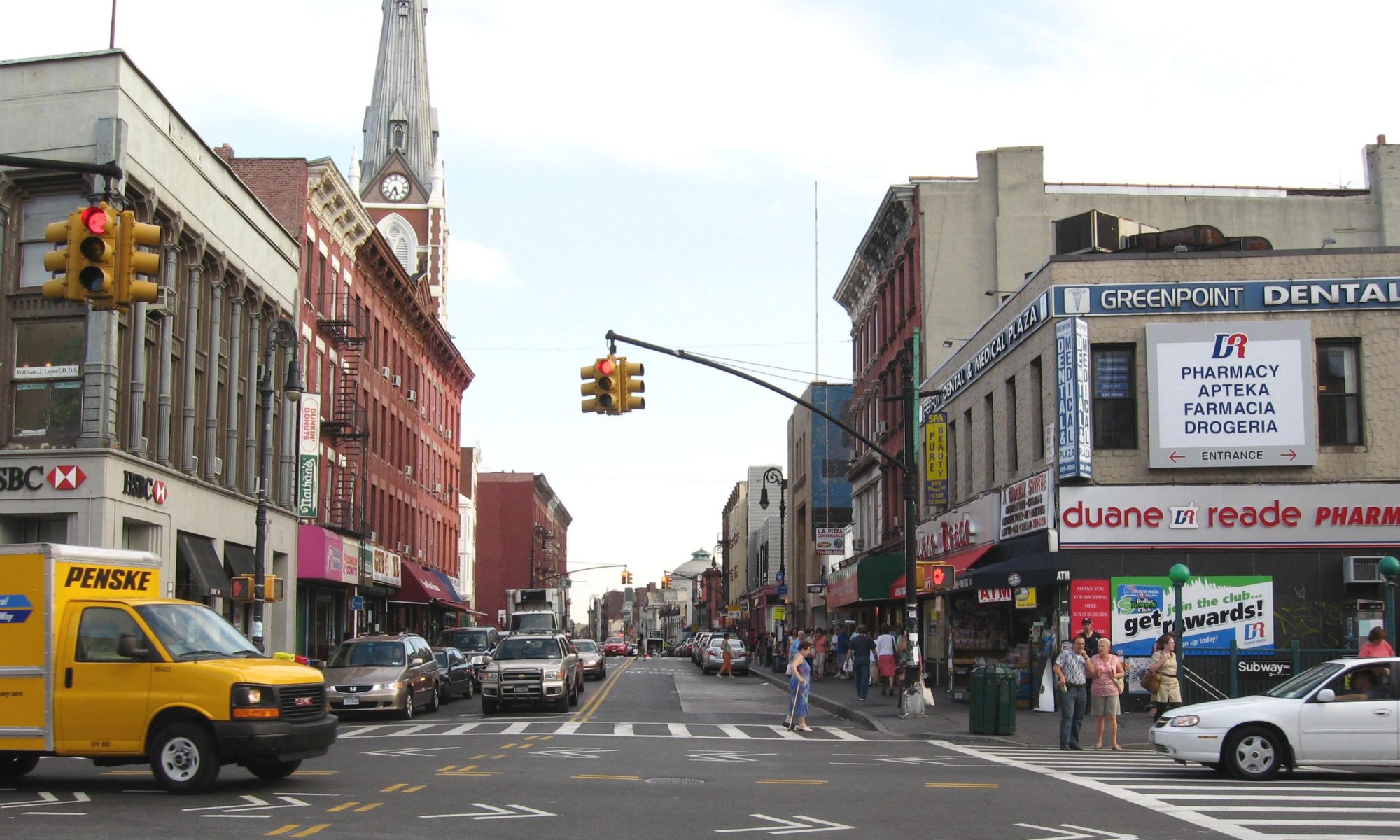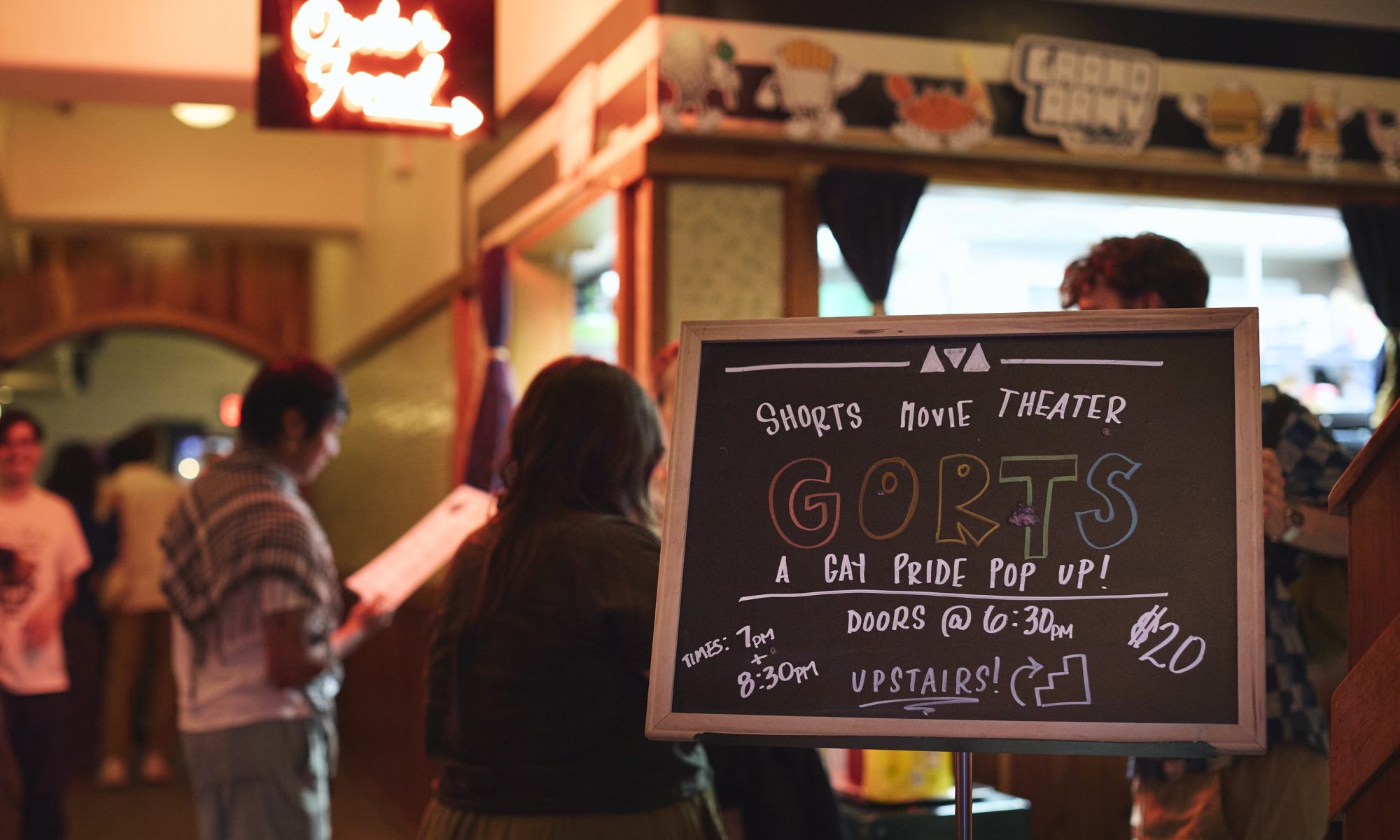By JACK DELANEY | jdelaney@queensledger.com
There’s a scene in the new series “Overcompensating” in which the protagonist, a college student who’s finally decided to drop his business major, eagerly shows his friend a short film he’s made. It opens with her lying in a bathtub full of milk, and the plot never gets much further than that. She carefully composes her face, but can’t quite hide her horror. “It’s bad,” he concludes, crestfallen.
On the first Tuesday of June, a bar in Gowanus played host to a different vision of what short films can be: not just a class project, but an event worthy of fanfare; less about navel-gazing, and more about capturing the multiplicity of human experience.
The draw of the night was “GORTS: A Short Film Pride Pop-Up,” a pilot for Shorts Movie Theater, creator Karma Masselli’s forthcoming brick-and-mortar venue. As the sun set outside, over thirty people — mainly in their twenties —buzzed around Threes Brewing, posing on the red carpet and chatting in large clumps before finding their seats. The evening’s two emcees, Declan Zhang and Michelle Kariuki, quickly had the crowd laughing as they shot an impromptu short film, the topic of which was drawn from a hat (“a popsicle lamenting capitalism as it melts”), with actors pulled from the audience. Then the lights dimmed, and the show began.
While the pop-up highlighted the craft of short films, it doubled as a celebratory kick-off to Pride. In the first feature, “Across, Beyond, and Over,” by Brit Fryer and Noah Schamus, two trans men reconnect after decades apart and heal old wounds as they contend with why they broke up in middle school. The second short brought the star power: director Chheangkea’s “Grandmai Nai Who Played Favorites,” which won top marks at this year’s Sundance Festival, follows a closeted gay boy in Cambodia whose family has arranged his marriage. A third and final piece, the low-budget comedy “Finding Bella” by Lucas Castro-Cruz, chronicles a New Yorker who becomes obsessed with tracking down an anthropomorphic pigeon.
“Despite the fact that short films make up a multimillion-dollar industry, with tens of thousands of shorts coming out each year,” explained Masselli, “the artists behind them have no real places to screen their work. Even the filmmakers behind Oscar-contenders find themselves having to rent out theater space on their own dime, just to qualify for the awards.”
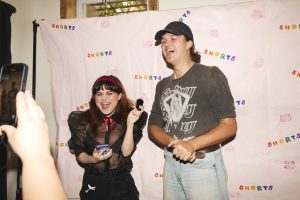
Though Shorts Movie Theater’s location is still being ironed out, Masselli has several more pop-ups slated for the coming months and is aiming for a launch early next year. She hopes to “harness the modern attention span,” but with a greater emphasis on community: “people can come in to see a short film for a couple bucks,” she envisions, “take a break in the bar and have a drink with their friends, and then go back in and see two more shorts—all before a dinner reservation or whatever their night holds.”
The Star caught up with Masselli to learn more about her influences, the inspirations behind the venue, and what she has in store for her upcoming events.
The pop-up was amazing! How did it feel to see everything come together?
My background is as a theater director, so I’m used to the feeling of, like, “the show is happening!” But I find myself always putting in so many extra elements that require so much work: the red carpet, the hand-painted back of the step-and-repeat, the stencil for the words. So it’s all the more satisfying fun to see it pulled off.
Where did the idea for this project come from?
One of the reasons why I started Shorts Movie Theater was because a group of my friends and I have been running this film collective for the past couple of years, called Neighborhood Film Festival. We call it a festival, but it’s not really that — we pitch projects to each other at the beginning of the year, then we co-produce them and put them all together, and we present them at the end of the year. There’s probably 20 of us who come in and out of going to the meetings.
We’re a bunch of theater makers, and we know each other from various projects or from going to school together. It was originally the idea of Laura Galindo, who was there last night. She invited a bunch of people over to her apartment and said, “We should make a bunch of movies to teach ourselves how to make films, since we’re theater makers. We know we have these skills in collaboration and in storytelling, but we don’t know anything about, like, how you make a schedule for a film shoot. So we started doing this collaborative thing. We’ve made about 20 movies in the past three-and-a-half years.
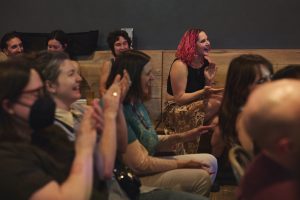
Shorts Movie Theater was my project for Neighborhood Film Festival this year. Instead of directing a movie, I was like, what if there was a venue that could channel our belief in what a theater experience brings to an art project? Being in an audience is so important to us as theater makers, and so I was working on the business plan instead of making a movie this year, bringing it to the meetings and talking it through with people and working on ideas. It has just become more and more real. [Shorts Movie Theater] is incorporated in New York and forming as a nonprofit. (NFF itself is “still just a groupchat,” Masselli said.) And we’ll have a couple more pop-ups planned for this summer to keep building momentum.
When did you first become involved in theater?
I’ve loved theater for so long. My grandfather was a composer for musical theater, and he showed me how to be an audience person and how to love going to the theater. It instilled in me this feeling that somebody sometimes has to show you how to love the thing that you’re getting into — it’s an apprentice-based work.
When I was 16, I decided I was going to see 100 shows in one year. I spent the whole year getting on the bus and going and seeing random plays. At the end of the year, I was like, I want to be a director. I went to NYU for theater directing, and have been developing new work in the city for the past six or seven years. It’s such an ephemeral type of work, where you make something and you work so hard on it, and then it just disappears the moment that it’s over. Especially the directing work: a playwright finishes and they have a script, but a director? You don’t have anything to point towards what you built, if what you built was right — which is that it’s an experience that people have that moves them. The proof of it is in their life moving forward, but you’re not a part of that.
I found myself wanting to make something where I could see the growth, and that coincided with me attending a film festival a year ago. I had had this idea a couple years ago, actually, that there should be a movie theater for short films. Like, why doesn’t that exist? It’s more common in Europe for shorts to play in theaters, but there’s not a single venue that is dedicated exclusively to short form content. I haven’t been able to find it. I’ve looked, and there doesn’t seem to be a permanent venue for short films anywhere.
I went to this fantastic festival called Middlebury New Filmmaker Festival, which is for first and second-time filmmakers, and that clicked another piece into place. There are all these incredible early projects, where you’re part of an exciting moment in someone’s career. But if it’s a short film, it has no way to connect with an audience. If it’s a really great film, hopefully a studio gets word of it, or someone who has some power finds out about it. [Yet] there’s no venue where an audience can enjoy it as an audience and not have anything to offer that person, just the capacity to enjoy their work and to follow it further.
The exciting part about shorts — one of many things — is the chance to bring the work of artists who are in development. To get those people interacting with their audience sooner in their career, rather than: you’re working for decades, and then you get a feature film, and that’s the first time a massive audience is seeing your work. In theater, we develop by presenting our work to an audience over and over again. There’s all these small theaters in the city where you have a weekend and you do your show, and that’s how I’ve developed as a theater director. It’s totally changed the kind of artist I am.
It’s different when you see the people who took time out of their life and came here and paid, and you have to encounter their physical reality. Then you watch them get bored by some decision you made that you thought was a good idea, and you’re like, “Oh.” Having to use their values and preferences as the barometer for success, rather than your own, is a crucial step as an artist. In my experience of directing, it’s important to burst the bubble of thinking that auteurship is the goal and having total control is the goal.
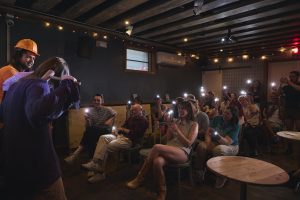
Because really, I think of directing as an act of service. You’re in service of an experience for all of these other people. In order to do that, you have to actually know: what do they need, what do they want, how can I possibly give it to them? Not just, what do I want to say — how can I show it to them? But you only get to think of your audience that way if you can see them and be in the room with them and feel what it feels like to not impress them, and to lose the chance to connect with them.
Being an audience member is such an enriching experience, because you go through this emotional catharsis with strangers, and you leave that space in peace. Nothing violent or bad happened between you and these other people, but something happened that you shared, and you’re able to move on. That’s a practice that, if you do it a lot, changes the way you look at the world.
And I feel that young people aren’t being invited into theater spaces as much — we’re like, “You can come in if you pay $100 and you sit here for two-and-a-half hours.” And young people are like, “I have no attention span and I have no money.” Well, then you don’t get to come to the theater. Building a space that caters to a modern audience gives us the chance to [cultivate] new audience-goers, and invest in them so that they develop the lifelong habit of going to the movie theater, or any theater.
How can you reinvent the experience, so that a modern person is like, I want to choose to do this? Amongst all my other costs, I want to watch short films. That means giving people more choice, more flexibility. The model for Shorts Movie Theater is that the movies will be programmed individually, not in a block. People can go in and out and see one movie, have a drink at the bar, go and see two more. You’ll pay for everything at the end: when you come, you’ll start a tab. You’ll get this ticket card that has all the movies we’re playing, and the usher will stamp the movie when you go in.
How did you develop this philosophy, which is super compelling to me, of what movie theaters and theater spaces in general need to do in this moment to survive? Are there any models you’ve drawn inspiration from?
My biggest inspiration, and my model for this, is my mom’s museum — she runs a children’s museum in Connecticut called Kidcity. She started it because she had two kids, she had nothing going on with her career, and she needed a place to feel like there was somewhere she could go and actually experience being a good parent. So she created this children’s museum out of her imagination and need for it, and it’s the most amazing place. It’s artistic and beautiful and creative. But the most important thing is that Kidcity is a nonprofit, and it’s the only museum of its kind in the whole country that operates off of its ticket sales.
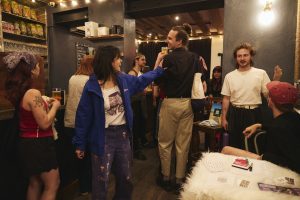
They don’t take donations. They’re not grant funded. They are able to stay open because their customer pays a ticket, and they basically operate like a business. They are mission-based, but my mom has always instilled in me that the person you take money from is your customer. If you take your money from your donor and that is how your business stays open, then that is the person who you’re serving.
It’s insane how many people make short films and they’ve seen, like, two of them — and I’m one of those people. I made a short film having probably watched one before. Then you watch all these shorts and wonder, why are they all making the same mistakes? It’s because you don’t watch short films, so you don’t know that everybody makes the same mistakes about these cliche moments. There’s economic value to be made here, and that’s really important to me. Not the money side, but the idea that [this venue] could be connected to the industry and connected to people’s lives.
Any final thoughts?
I see Shorts Movie Theater as a play, basically. It’s people going into a shared space, experiencing something, and leaving. How can we craft their emotional arc so that they walk away thinking, “Oh my God, I really like my life, I want to be a part of this world, and I want to keep being engaged?”
Want to learn more? Visit https://www.shortsmovietheater.com to sign up for the project’s mailing list, and to find info about the next pop-up.
